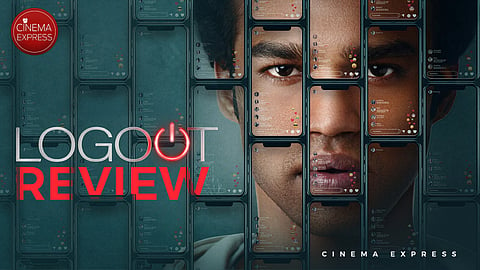

It is the season of social media deep dives. Viewers might be hooked to their phones, but some filmmakers are taking a plunge to present a critique of its perils. Babil Khan’s Logout comes after Vikramaditya Motwane’s CTRL, featuring Ananya Panday as an obsessive influencer. The film is not as experimental and Black Mirror-like, but unfolds more as a cat-and-mouse chase that happens in a room in front of a computer screen. The setting of a smart house, with voice-controlled devices and flashy lights, becomes a fitting reflection of the claustrophobia created by having a beta personality online. So, suddenly, when the Bluetooth speaker starts vibrating, the vacuum cleaner begins to creak, the lights fluctuate and you hear a deep, cracked voice—it is not a ghost, like old times. Your house has been hacked. Welcome to new-age horror.
The smart house belongs to Pratyush (Babil), or Pratman to his 9.8 million followers on social media. He practically lives in the digital world, unable to hold a real conversation for even a minute without having to check his phone. His only goal is to reach 10 million followers before his competitors. Pratyush’s life is wrapped inside the palm-sized device containing details of his bank account, social media passwords and personal photos with his ex. When he wakes up one day to find it lost, he is devastated. An obsessive teenage fangirl gets access to his phone and starts making shady demands to catch his attention.
Starring: Babil Khan, Rasika Dugal, Gandharv Dewan and Nimisha Nair
Written by: Biswapati Sarkar
Directed by: Amit Golani
Streaming on: ZEE5
There are signs here of stalker stories, like Shah Rukh Khan’s Darr (1993) and Fan (2016), where love and obsession turn deadly. But the blows here are all digital, the scars psychological. Writer Biswapati Sarkar lets the story unfold with restraint. There’s no rush to bring all the cards to the table. He makes some pressing observations about the delusion created by influencer culture and how the space has become representative of a heartless state of being. The fangirl posts a video of Pratyush eating chicken on his social media, calling out the lie he told his followers that he is vegan to promote a brand. The phone here acts like a voodoo doll from a horror film, controlling a character from a distance. At first, Pratyush is scared, but the eventual controversy makes him viral, adding to his follower count. “We will do something about it once I reach 10 million followers,” he tells his manager.
Biswapati doesn’t let this satirical tone of the story get in the way of humanising the characters. Pratyush is not a caricature but goes through a journey of getting more in tune with his real emotions that were earlier obscured by the monotony of digital life. This is portrayed through a moving (although a bit too literal) metaphorical interlay. Earlier in the film, Pratyush orders a rat trap in order to cage the rodent roaming around his house. When the rat is finally caught, the visuals juxtapose with Pratyush becoming a slave to the demands of the fangirl who has his phone. Like the rat, Pratyush is trapped in the vicious cycle of his online life. He undergoes a change of heart later when he feels for the struggling rat and decides to let it go. Babil embodies this transformation quite well. There is a genuine urgency in his performance. He balances the stiffness of his character with a vulnerability that speaks louder. When he shouts at the computer screen, you feel his frustration. When he cries in desperation, you are moved to tears too. You are gradually led to grow from disliking his character to understanding his grievances a little more.
It is unintentionally meta too. Actors are also social media influencers, which entails a strange familiarity in such narratives. On-screen, they critique the same world which they plainly inhabit in reality. Babil has more than a million followers on Instagram. His posts are an even mix of theme-based shoots, some brand collabs and lively throwback photos with his father, the late Irrfan Khan. In the film, his character shares a complex relationship with his dad and goes about realising his mistake towards the end. When he cries on his dad’s shoulders, there’s an uncanny recollection of Babil’s own life. It is a powerful scene. Maybe Babil channels part of his own grief in that short, dreamlike moment. There is little guise of a performance. For some fleeting seconds, cinema, memory, and mourning seem to speak the same language.